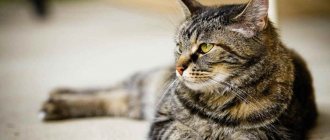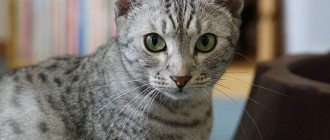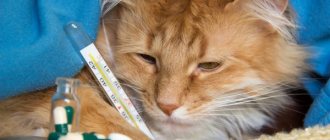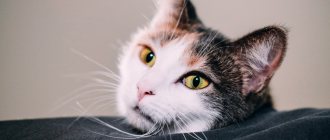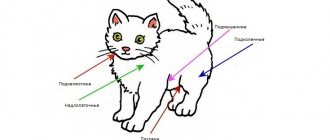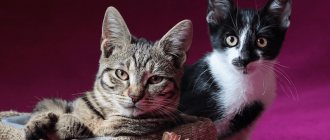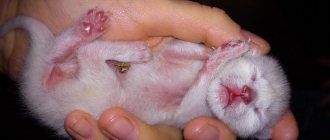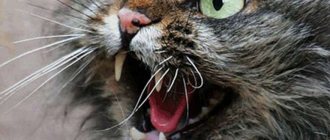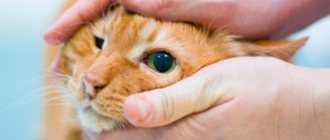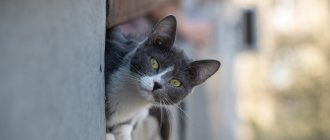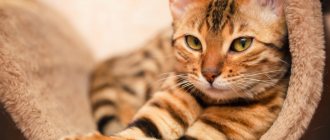Vitamin deficiency is a disease caused by a lack of certain vitamins in an animal's diet. It can occur in cats of any age and breed, and there is no genetic predisposition to this disease. Believing that vitamin deficiency does not pose any danger, many owners are seriously mistaken.
Read in this article:
- Causes of vitamin deficiency in cats
- How does the disease manifest?
- Vitamin A
- Vitamin B
- Vitamin C
- Vitamin D
- Vitamin E
- Vitamin K
- What is the danger of vitamin deficiency in cats?
- Prevention of vitamin deficiency
Causes of vitamin deficiency in cats
In 70% of cases, vitamin deficiency in cats occurs due to an unbalanced diet. If you feed an animal only fish or only meat, then its body does not receive the full range of nutrients with the exception of proteins.
A lack of a certain vitamin can be caused by: exclusion of fresh vegetables and herbs (for example, lettuce leaves) from the diet, feeding the cat exclusively with ready-made food, and the predominance of canned and smoked foods.
Other reasons that can cause vitamin deficiency:
- Parasites. Ticks and other blood-sucking insects can provoke not only anemia, but also a lack of certain vitamins;
- Gastrointestinal disorders. Among them: ulcers, gastritis, acute colitis, etc. They disrupt the absorption processes of vitamins, which leads to their obvious deficiency;
- Parasitic diseases. Helminths in the pet's body absorb most of the incoming vitamins.
Less commonly, vitamin deficiency develops as a result of infection, endocrine diseases, and cancer.
How does the disease manifest?
The main danger of vitamin deficiency is latency. During the first weeks, the lack of vitamins in the cat’s body is invisible. The deficiency begins to affect the functioning of internal organs and systems, but outwardly the animal looks quite healthy.
At the next stage of development of vitamin deficiency, general symptoms appear that are not characteristic in the absence of a specific vitamin:
- weight loss,
- dull coat,
- dry skin,
- strange behavior for a pet.
This condition is observed for 3-4 months, after which it is replaced by characteristic symptoms indicating a deficiency of a specific vitamin in the body. When the first signs appear, you should contact a veterinary clinic in Moscow and get professional advice. The sooner vitamin deficiency is detected, the faster the cat’s health will be restored and negative consequences will be avoided.
Vitamin A
A is a fat-soluble vitamin, the deficiency of which causes growth retardation, visual impairment and decreased coat quality. Its deficiency is especially dangerous for kittens, who have a high probability of damage to the mucous membrane of the eyes and subsequent development of conjunctivitis.
If there is no or insufficient vitamin A in a cat's diet, then the cat will experience the following symptoms:
- inflammation of the mucous membranes,
- slow growth
- weight loss,
- "night blindness"
- nervous system disorder.
To cope with vitamin deficiency and replenish vitamin A, you need to add a number of products to your pet’s diet: butter, yolks, fish oil, beef liver.
List of products and specific signs of deficiency
Vitamin deficiency is rare in a kitten that was fully fed by a cat. If it turns out that you took an animal from the street, you should provide it with the following products: fish oil, bone meal, children's nutritional supplements. It is possible to add brewer's yeast within reasonable limits.
Before adding vitamins, of course, you should consult with a specialist who will create a diet taking into account the individual characteristics of your pet. Fat-soluble (A, D, E, K) and water-soluble (B1...12, C) vitamins should be added separately.
A
It is caused by deterioration of vision, damage to the mucous membrane, and the development of conjunctivitis, which has an unpleasant effect on the cat, as a representative of the nocturnal lifestyle. Vitamin A deficiency can lead to intestinal problems (specifically, loose stools).
An important sign of vitamin deficiency is deterioration in the condition of the skin and hair: the coat becomes dull, the skin dries out . The cat loses its external attractiveness. Products for prevention: fish oil, eggs (yolk), butter, beef liver.
IN
Vitamins B1 - thiamine and B2 - riboflavin are responsible for maintaining the nervous system and nerve signal activity. A deficiency leads to poor digestion and reduces the level of hemoglobin in the blood. Serious disorders include pathologies of pregnancy and postpartum injuries.
A problem with vitamin B1 leads to dry mucous membranes and susceptibility to infectious diseases. A lack of vitamin B6 can lead to problems with the musculoskeletal system (arthritis and urolithiasis). Possible stomatitis.
Vitamin B12 deficiency in the body will lead to poor intestinal absorption, which can lead to constipation. Leukemia, a blood clotting problem, may develop.
Products for prevention: raw meat and its by-products (liver, poultry kidneys), bone meal, dosed brewer's yeast, eggs, fermented milk products (yogurt, snowball, bifid), fresh herbs, zucchini, carrots.
IMPORTANT! Water-soluble vitamins are not always combined and can lead to complications.
For example, vitamins B6 and B12 are destroyed upon contact; B1 and B12 - vitamin B12 is partially oxidized, an overdose of such vitamins causes shock; B1 and B6 - slow down the absorption of both.
WITH
The absence of ascorbic acid leads to decreased immunity. Stomatitis develops, gums bleed, tooth loss and serious gum disease are possible.
A lack of vitamin C interferes with collagen formation, which leads to joint problems and an unsteady gait. Citrus fruits are contraindicated for cats, including in the form of purees and juices.
Products for prevention: carrots, lettuce leaves, ascorbic acid from the pharmacy, turnip or pumpkin.
D
Dangerous primarily for kittens. Due to problems with the metabolic processes of phosphorus and calcium, the animal develops rickets, bones become deformed, and the size of the joints changes. Kittens are developmentally delayed and have breathing problems.
Products for prevention: meat and dairy products (low-fat cottage cheese), egg yolk and brewer's yeast.
E
Problems with the reproduction of offspring are associated precisely with vitamin E deficiency. Chronic infertility or lethargy of sperm are the main diseases with vitamin deficiency. Pancreatitis may develop.
Products for prevention: some sea fish, fresh herbs, dairy products, premium store food.
Vitamin B
B - a lack of vitamins of this group leads to metabolic disorders and a decrease in hemoglobin content, thereby provoking a disorder of the nervous system. The cat suddenly loses weight, develops convulsions, and, in particularly severe situations, develops a fever.
The most beneficial vitamins for pets are from group B: B1, B2, B3 (PP), B5, B6 and B12. Their lack in the animal’s body causes:
- anemia,
- digestive disorders,
- weakness and apathy,
- excessive hair loss,
- dullness of the skin.
The following foods will help save your pet from vitamin deficiency due to a lack of B vitamins: raw meat, liver, cottage cheese, milk, beans and soy. B6 and B12 are recommended to be administered intravenously using injections.
Details
Prerequisites for the development of vitamin deficiency
Vitamin deficiency in cats is not a disease of one day. Long-term regular lack of vitamins does not immediately develop into a disease. The causes of the disease are:
- Weak immunity
- Imbalance in nutrition
- Early weaning from the cat and improper feeding
- Diseases of any origin, gastrointestinal diseases are especially dangerous
- Postoperative recovery
- Negative environmental influences
- Pregnancy and lactation
- Prolonged stress
- Chronic diseases
- Parasite infestation
- Taking antibiotics and potent drugs
As you can see, many factors can lead to vitamin deficiency in a cat, so in addition to the reasons, it is important to know how the disease manifests itself.
Signs and symptoms
There are several symptoms of vitamin deficiency in cats, all of which are reflected in their appearance. At the same time, signs of vitamin deficiency in cats appear depending on what specific substance the body lacks. In the first stages, it is impossible to determine the deficiency externally, which is why it is recommended to regularly take a general blood test to clarify the internal balance of nutrients. External signs make themselves felt when a lack of a vitamin or microelement has already affected the pet’s body.
Manifestation of a specific vitamin deficiency in a cat:
- Retinol (A) – its deficiency is especially dangerous for kittens and young animals under one year of age, since, in addition to many other body functions, retinol in all animals affects the development of a healthy reproductive system. In adulthood, its deficiency already affects the skin, the quality of the intestinal epithelium, the resistance of the mucous membrane of the eyes to conjunctivitis, and also maintains the quality of the skin and coat. If your cat develops dandruff and dry skin, this is a sure sign of a lack of retinol.
- Group B – is responsible for the stability of the nervous system. A group of vitamins has a direct effect on the central nervous system, so if there is a deficiency, the animal first weakens, muscle strength decreases, lethargy appears and activity decreases. If treatment is neglected, frequent convulsions, tremors of the limbs may begin, and in extreme cases, coma may occur. If a pregnant cat does not receive enough B vitamins, then problems arise with labor, severe bleeding and birth injuries in the offspring may occur due to process failures.
IMPORTANT: with a lack of B vitamins in a cat, not only the supporting muscles weaken, but also all the internal muscular systems of the cardiovascular system and intestines.
- Vitamin C is the basis for the stable functioning of the cat’s immune system. It is difficult to feed porridge with vitamins naturally, because fruits with a high content of vitamins can cause an allergic reaction, and acidic foods have no place in the animal’s diet. However, the body must receive it, otherwise problems arise with frequent viral diseases, bleeding gums, stomatitis, coordination of movements is impaired, and joint diseases progress very quickly.
- Vitamin D is the second important vitamin for kittens; without it, there is a high risk of developing rickets. In adult cats it leads to brittle bones, joint diseases and vascular problems. The difficulty of natural consumption is that many cats are contraindicated from being in the sun, so natural production must be supported by external consumption. Also, without vitamin D, calcium, phosphorus and potassium cannot be absorbed.
- Vitamin E is the most dangerous period of deficiency - the stage of formation and maturation of the fetus in the womb. For a cat, a deficiency threatens miscarriage and subsequent infertility. The rest of the time, a lack of vitamin E leads to pancreatitis and gastrointestinal diseases. Often, insufficient consumption of this vitamin leads to serious diseases in cats, the cause of which cannot be determined for a long time.
- Vitamin K is a hematopoietic vitamin; without it, blood quality in cats decreases.
Treatment regimen
Treatment of vitamin deficiency in cats should be carried out under the supervision of a doctor and only after taking a blood test to determine the missing substances. Self-medication may not work, as the illness may be caused by a virus, fungus or infection, which manifests itself in the same way as a lack of a specific vitamin. And vice versa - thinking that you are treating vitamin deficiency, you can start the disease.
Home treatment, or rather prevention, should consist of normalizing the cat’s nutrition. As soon as you begin to suspect that your cat is not getting enough of something, include in the diet:
- Vegetable oil, flaxseed oil or ground flax seed.
- Sprouted wheat.
- Add rosehip decoction.
- Increase the serving of carrots, lettuce, parsley, and turnips.
- Cod liver is good in limited quantities.
- Choose higher quality meat.
If home measures do not help, and the problem gets worse, get tested for vitamins and minerals in your body. Perhaps the problem is already complex and simply improving the quality of nutrition is no longer enough.
Vitamin C
C (ascorbic acid) is a vitamin that helps strengthen the immune system and activates the action of enzymes. Its lack in the body can lead to joint swelling and multiple internal hemorrhages.
The complete absence or deficiency of vitamin C causes a number of unpleasant symptoms in pets that worsen the animal’s condition:
- inflammation of the gums and loosening of teeth,
- weakening of the immune system,
- metabolic disorders,
- pain in the muscles.
These symptoms of vitamin deficiency can be eliminated by preparing a balanced diet for your cat. Recommended products include: potatoes, kidneys, milk, carrots, salad. Rose hips will help effectively restore the balance of vitamin C in the body, but the cat will refuse to eat it raw. Veterinarians recommend adding a decoction or infusion of the berry to already prepared food.
Vitamin D
D is a vitamin that serves as a “building material” for the teeth and bone tissue of animals, and also regulates the content of potassium, calcium and magnesium. Its deficiency can cause rickets and other problems associated with the proper development of the animal’s skeleton.
Note! Vitamin D deficiency is especially dangerous for kittens: it can cause skeletal deformation and serious diseases of the skeletal system.
The first thing that signals vitamin deficiency is a change in tastes. Instead of meat and fish, your pet can lick lime and even eat soil. Vitamin D is synthesized under the influence of sunlight, so it is more often observed in cats that are not outdoors.
If you don’t want to let your pet go for walks, then at least let him visit the balcony. Among the foods that can increase the level of vitamin D in the body: sprats, milk, egg yolks. Calcium supplements are effective.
What is the danger of vitamin deficiency in cats?
A lack of vitamin A, B, C, E or D in a cat's body causes numerous unpleasant symptoms. This is due to the fact that they take part in almost every process occurring in the animal’s body.
Their deficiency leads to deterioration of the mucous membranes and diseases of the internal organs of the digestive, respiratory, nervous and musculoskeletal systems. Reproductive function disorders are possible: spontaneous abortions, complications after the birth of kittens, etc.
Many cat owners believe that they can cope with vitamin deficiency on their own. Unfortunately, it is not. Only an experienced veterinarian will be able to determine which vitamin is missing in the animal’s body. He will tell you what foods and vitamin-mineral complexes should be included in your pet’s diet.
Mr. Cat recommends: how to solve the problem
There is no systemic treatment for vitamin deficiency. The main thing here is to identify the problem in a timely manner and understand which groups of vitamins the pet lacks.
You should not give your cat vitamin-mineral complexes independently and uncontrollably. Excess vitamins can lead to smaller, and sometimes even bigger, problems.
It is important to properly adjust the animal’s diet. The veterinarian usually prescribes the use of complexes when the cat eats natural food, in which it is difficult to achieve the required content of the necessary elements.
If your pet is on dry formula, then you may need to switch to more expensive but high-quality food. For example, in the holistic class they are all balanced and no additional vitamin intake is required. This is Savarra, Monge, Grandorf.
If the problem has gone far and adjusting the diet does not solve it, then you will have to purchase special vitamin complexes. The table shows some of them.
| Name | Characteristic | Price, rubles |
| Excel Brewer's Yeast 260 tablets | B vitamins. Contains zinc, brewer's yeast, tuna fat. Appetite, coat and skin quality increase, and the functioning of the nervous and immune systems improves. | 455 |
| Beaphar Top 10 Cat 180 pieces | Multivitamin complex with taurine. A broad-spectrum drug that strengthens the immune system. Can be given to kittens. | 623 |
| Anivital Feli Immun 140 tablets | Vitamins C and E, iron, choline, folic acid. Broad-spectrum complex. | 1730 |
| Beaphar Kitty Mix 180 tablets | Vitamin and mineral complex with taurine, phosphorus, sodium, biotin, leucine, calcium. Strengthening the cardiovascular and immune systems. | 1391 |
| Canina Canivita 100 ml | Multivitamin complex (A, B, C, D, E). Reduces cholesterol, improves heart function, improves immunity, improves the quality of coat and skin. | 936 |
| Gimpet Multi-Vitamin Paste Extra 200 g | Multivitamin complex in paste form. | 640 |
| VetAminex 60 pieces | Multivitamins with zinc, calcium, phosphorus, folic acid. | 2000 |
| Radostin 90 pieces | Vitamin and mineral supplement. | 201 |
| Biorhythm for kittens (morning + evening) 24 doses | Vitamin and mineral complex with taurine, calcium, phosphorus, iodine, molybdenum, iron, zinc, selenium, copper. | 235 |
Prevention of vitamin deficiency
Nutrition correction will help you eliminate vitamin deficiency and prevent its manifestation in the future. Start by changing your cat's diet, following your veterinarian's recommendations. By enriching the diet with vitamins and adding mineral complexes to complementary foods, you will be able to restore your pet’s condition.
However, be careful when giving vitamins and dietary supplements to pregnant cats. During pregnancy and feeding kittens, they lose a lot of amino acids and calcium, so choosing the right diet is possible only after consulting a veterinarian.
Remember, your pet's health is in your hands!
Treatment
Treatment of vitamin deficiency begins with a qualitative improvement in the animal’s feeding. He needs to be fed food rich in vitamins. Of course, spoiled food, as well as those whose expiration date has expired, are immediately thrown away and feeding is stopped.
Reference!
As drug therapy at home, either intramuscular or oral administration of a vitamin complex is used. And we must not forget to treat those diseases that are still “available”.
